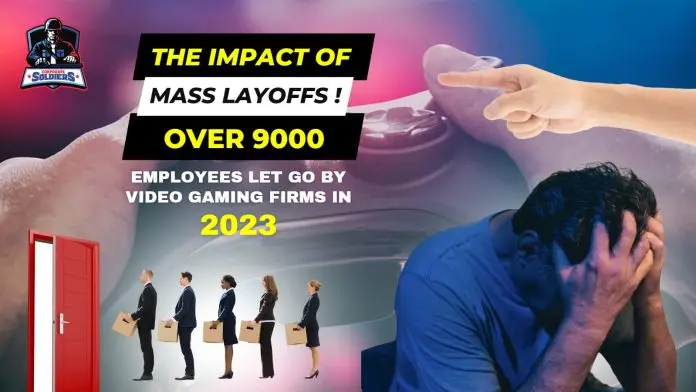Throughout 2023, the video game industry faced a series of significant layoffs, impacting over 9,000 employees globally. One of the most notable occurrences came in September when Epic Games, the developer behind the widely popular game Fortnite, announced a reduction of approximately 16% of its workforce, affecting nearly 870 individuals. In an internal email to employees, Epic CEO Tim Sweeney acknowledged the necessity of these layoffs due to the company’s financial situation, stating, “We’ve been spending way more money than we earn. I had long been optimistic that we could power through this transition without layoffs, but in retrospect I see that this was unrealistic.”
Following suit in November, Ubisoft, a prominent French video game company known for franchises like Assassin’s Creed and Far Cry, underwent a corporate restructuring effort resulting in approximately 124 employees losing their jobs.
The Embracer Group, known for its extensive acquisitions of gaming studios, media companies, and the IP rights to The Lord of the Rings, faced a significant reorganization this year. However, their investment strategy’s failure led to the closure of three studios, the cancellation of several projects, and the dismissal of over 900 employees, as reported by The Verge.
Among the companies affected, gaming giant Hasbro let go of 1,000 employees, notably impacting the team that had been working on Baldur’s Gate 3 in collaboration with Larian Studios.
Additionally, Electronic Arts (EA) saw a workforce reduction of about 6%, equating to approximately 780 job losses. Moreover, various other gaming industry titans, including BioWare, Microsoft, Bungie, Naughty Dog, Amazon, CD Projekt Red, Sega, Unity, and Activision Blizzard, were also confronted with layoffs throughout the year.
The collective scale of these layoffs has not only affected the immediate employees but also highlighted the broader challenges and shifts within the video game industry. The impact on individuals, families, and the industry itself is a testament to the complexities and volatility of this dynamic sector.
The layoff of over 9,000 gaming industry employees in 2023 stemmed from a complex interplay of factors.
- Financial Strain: Many firms, including Epic Games and EA, attributed the layoffs to financial strains. Epic Games’ CEO, Tim Sweeney, admitted overspending, necessitating downsizing. Financial constraints were echoed across the industry, indicating widespread economic challenges.
- Corporate Overhaul:Ubisoft’s reduction of 124 employees was part of a larger corporate restructuring. Embracer Group’s restructuring post a failed investment strategy led to closures and layoffs affecting over 900 employees.
- Market Changes and Project Shifts:Layoffs often followed project cancellations or alterations in market strategies. Hasbro’s cut of 1,000 jobs, including Baldur’s Gate 3 team members, mirrored the impact of project changes on staffing.
- Industry-Wide Impact: The layoffs cascaded through major gaming firms, suggesting broader industry challenges. This might signal market saturation, changing gamer preferences, or unforeseen shifts in gaming trends.
The confluence of financial stress, corporate restructuring, project cancellations, and larger industry dynamics led to these extensive layoffs, impacting thousands of employees across diverse gaming companies in 2023.
The Offer final thoughts on the significance of these layoffs and the need for a more sustainable approach to employment in the gaming industry.
The extensive layoffs affecting over 9,000 employees in the gaming industry during 2023 signify a crucial inflection point, underscoring the need for a fundamental shift towards a more sustainable employment paradigm within the sector.
These mass workforce reductions unveiled vulnerabilities within gaming companies, exposing the repercussions of unchecked growth, imprudent financial management, and a lack of foresight. The ripple effects reached beyond mere numbers on a spreadsheet, impacting the lives and livelihoods of thousands, leaving a profound human toll and highlighting the industry’s fragility.
Amidst this upheaval, it becomes evident that a redefined approach to employment practices is imperative. The industry must pivot towards strategies that prioritize stability, prudence, and resilience. This includes recalibrating growth ambitions, fostering financial prudence, and embracing adaptable organizational structures that can weather market uncertainties without resorting to sweeping layoffs.
Moreover, a critical shift towards nurturing and empowering the workforce is indispensable. Investing in continual skill development, creating supportive work environments, and ensuring job security can mitigate the drastic effects of potential future downturns. This human-centric approach not only safeguards employees but also fortifies the industry against systemic vulnerabilities.
The significance of these layoffs extends far beyond mere job losses. They serve as a catalyst for introspection and transformation, compelling the gaming industry to reassess its modus operandi. By embracing a more sustainable approach to employment—one that prioritizes financial resilience, adaptive structures, and employee well-being—the industry can forge a path towards a more stable, equitable, and prosperous future, benefitting both its workforce and the industry as a whole.










